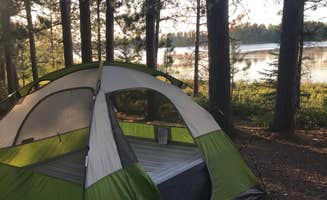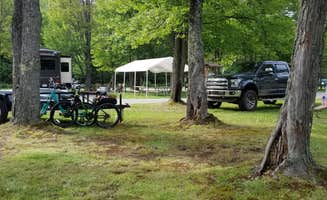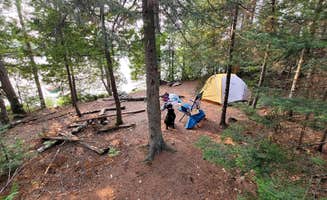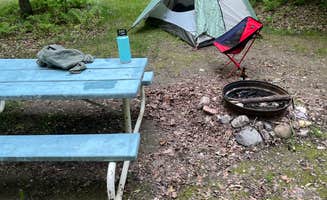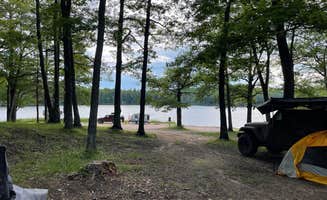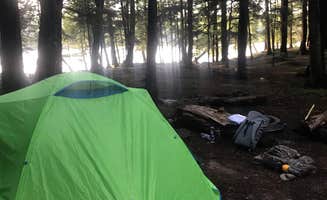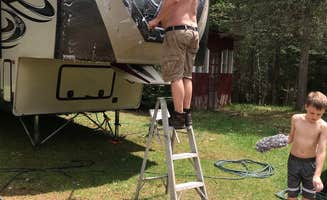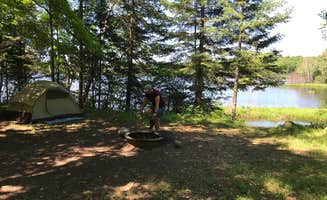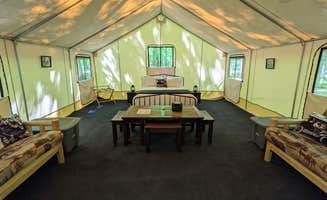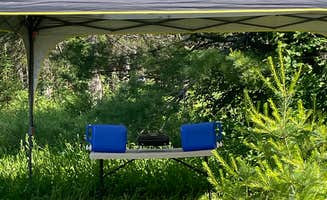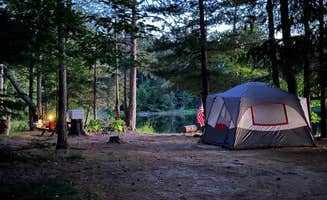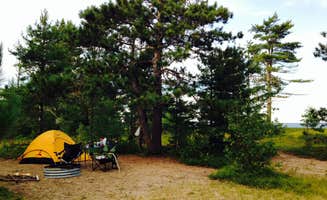Dispersed camping sites dot the landscape near Watton, Michigan, nestled in the western Upper Peninsula's Ottawa National Forest. This heavily forested region sits at elevations between 1,200-1,600 feet with cold winters and mild summers. Access roads to most camping areas deteriorate after spring thaw, with rutted surfaces requiring careful navigation through October.
What to do
Paddling access points: Big Lake State Forest Campground offers a small craft launch within the campground. One camper noted, "The lake was nice and there was a small beach. Enjoyed listening to the sandhill cranes every morning."
Hiking the North Country Trail: Multiple primitive campsites connect to this long-distance trail. According to a visitor at Big Lake, "The North Country Trail winds through this part of the UP, and the Big Lake campground would make a perfect starting or ending place for a section hike."
Waterfall viewing: The region features multiple accessible falls near camping areas. At Burned Dam Campground, one reviewer observed, "Camp is right on a river and the rapids will draw you in. Follow the trail 20 yards and you can find a variety of boulders or logs to perch upon."
What campers like
Privacy between sites: Most dispersed tent camping near Watton offers significant spacing between campsites. At Lake Perrault, a camper described it as "a dispersed area with some sites with fire pits that are cleared and open for camping, maybe about 6 spots or so. A couple of the spots are right down at the water."
Pristine wilderness setting: The undeveloped nature of the area provides true wilderness experiences. A camper at Sturgeon River Gorge Wilderness commented, "This patch of wilderness within the Ottawa National Forest is unmatched. I didn't think I was in the Midwest. Remote and not well traveled."
Wildlife viewing: The remoteness creates opportunities for animal sightings. One visitor to Lake Perrault mentioned, "There was some interesting animal calls overnight as well," while another at Big Lake reported seeing "browsing deer and pheasants."
What you should know
Road conditions: Access roads to primitive sites require appropriate vehicles. One camper at Paint River Forks NF Campground warned, "5 or so campsites. Clean out house right on river. Just a mile or so down the dirt road."
Seasonal considerations: Winter arrives early in the UP. A visitor to Big Lake cautioned, "In mid-October, we woke up to full on winter one morning, so be prepared for anything in the shoulder season."
Insects: Biting insects present significant challenges at many sites during summer. A camper at Burned Dam Campground noted, "This campground was FULL of mosquitos and biting flies. Even with bug spray, the assault was nonstop. Bring a screen-printing popup shelter with you or you will suffer."
Tips for camping with families
Choose developed sites with basic amenities: For camping with children, sites with toilets provide easier logistics. At Big Lake State Forest Campground, "Bathrooms are simple pit-toilets, and water is accessible year-round with the hand operated well pump."
Consider recent forestry operations: Some areas experience periodic logging. As one camper observed, "This area is being logged so many trees are gone. This makes it less pleasant now but that will change over time."
Look for swimming access: A few sites offer small beaches suitable for children. One visitor at Emily Lake State Forest Campground mentioned, "Great view down a small hill at the back of the site" with access to water where they "caught some blue gills."
Tips from RVers
Limited clearance on access roads: Most tent camping sites near Watton present challenges for RVs. A visitor to Big Lake warned, "The entrance to this campground is not for low clearance vehicles...it is full of HUGE flooded potholes (small ponds really). Not recommended for 2 wheel drive, low clearance vehicles."
Size restrictions at primitive sites: Few dispersed camping areas accommodate larger rigs. At Lake Perrault, a camper noted, "There are a few spots suitable for a small travel trailer, but most of them are better suited to tents."
Distance from supplies: Stock up before heading to camp. A visitor to Big Lake mentioned, "Within 10 miles back on the highway is a large gas station/convenience store and café where you could get a hot meal or stock up on a few essentials."


